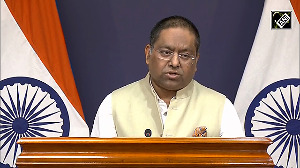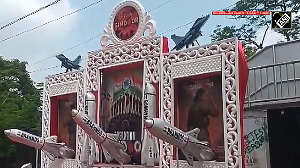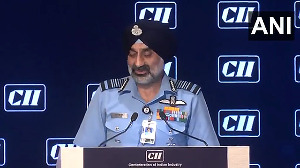Talking tough on terror in the backdrop of tension on the Indo-Pak border, India told United Nations Security Council that nations using terror as an "instrument of state policy" are "short-sighted" and have invariably themselves suffered immensely from the "Frankenstein monster."
Participating in a counter-terrorism debate presided over by Pakistan's Foreign Minister Hina Rabbani Khar, Indian envoy to the UN Hardeep Singh Puri said the fight against terrorism has to be "unrelenting and fought across all fronts".
He emphasised that the international community cannotafford selective approaches in dealing with terrorist groups or in dismantling the infrastructure of terrorism.
"Terrorism is a Frankenstein monster. Resort to the use of terrorism as an instrument of state policy is short-sighted. Indeed, those who have taken recourse to it have invariably themselves suffered immensely from it proving the age old dictum that those who play with the sword, shall also perish by it," Puri said at the debate which was organised by Pakistan in its capacity as the current President of the 15-nation powerful Security Council.
While India's two-year term as non-permanent member at the Council ended last month, it participated in the day-long debate. Khar shook hands and greeted Puri as she was leaving the Security Council hall at the UN headquarters during the debate.
Puri told the Council that India has faced the "scourge of terrorism" for over two-and-a-half decades with the entire South Asian region being "wracked by the activities of the biggest terrorist actors in the world, be they Al Qaeda, Lashkar-e-Tayiba, Jamat-ud Daawa, elements of Taliban and others."
He said terrorism, extremism and radicalisation continue to pose a serious challenge to peace, progress and prosperity in the region.
Puri noted that the landscape of international terrorism has undergone vast changes over the years, with terrorists becoming globalized in their outreach and activities.
"They recruit in one country, raise funds in another and operate in others and are waging an asymmetric warfare against the international community," the Indian Ambassador said.
He said terrorists' "veritable nexus" with transnational organised crime, drug and arms trafficking is well-established and terrorist financing, illicit money laundering, drug trafficking, piracy and illicit arms trade remain intertwined in a complex web of toxic relationship.
India accuse Pakistan of harbouring terrorists and Indian Home Minister Sushilkumar Shinde last week said Lashkar-e-Tayiba founder Hafiz Saeed had visited the border areas in Pakistan-occupied Kashmir a few days before the killing of two Indian soldiers by Pakistani troops at the Line of Control.
Puri expressed concern over the growing risk of weapons of mass destruction falling into the hands of terrorists, who are capable of misusing cyberspace and related technologies.
"Terrorism today constitutes the most pressing challenge to international peace and security. It is a scourge that undermines peace, democracy and freedom and endangers the foundations of democratic societies. It is a global threat that recognises no border, nationality, ethnicity or religion and there is hardly any region of the world that has not been scarred by terrorism," he added.
Puri reiterated India's condemnation of terrorism in all its forms and manifestations, emphasising that no cause or grievance can justify taking recourse to terrorism.
He stressed that the UN needs to strengthen the normative framework for its counter-terrorism strategy through the adoption of a Comprehensive Convention on International Terrorism.
India, which has been in the forefront of global counter-terrorism efforts, had chaired the UNSC Counter-terrorism Committee during 2011-12. India was instrumental in introducing 'zero tolerance' towards terrorism in UN lexicon, providing a renewed momentum to global counter-terrorism efforts.
Puri noted that the success in fight against terrorism goes "hand-in-hand" with progress in strengthening counter-terrorism cooperation and exchange of information at the international, regional and sub-regional level.
"A large number of terrorist plots can be neutralised by sharing of information and effective international cooperation. We believe that apart from law enforcement measures, the preventive aspect is equally important. Focus on development, education, social integration, tolerance, rule of law and respect for human rights are the integral components of such an approach," Puri added.
He lamented the challenges that the international community continues to face in combating terrorism despite the progress achieved so far.
"Foremost is the need to remove the moral and legal ambiguities that allow terrorists to gain succour and legitimacy. Progress under mutual legal assistance and extradition cases is still sketchy and is yet to be fully mainstreamed as part of regional and international counter-terrorism efforts," he said.
Puri also underlined the need to strengthen enforcement efforts to destroy safe havens for terrorists, their financial flows and support networks adding that mechanisms developed to pool the resources of the international community need to be augmented and made more effective.










